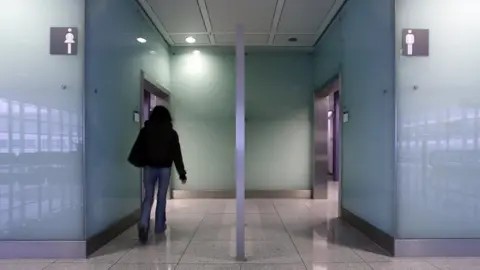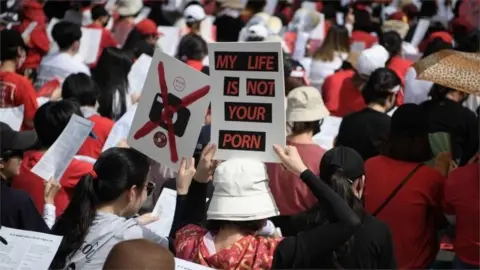'I was humiliated': The continuing trauma of South Korea's spy cam victims
 Getty Images
Getty ImagesKyung-mi (not her real name) was mocked online, sneered at by social media bullies and interrogated for hours by police and prosecutors after accusing her K-pop star boyfriend of filming her while they were having sex.
She was the victim of a digital sex crime but she told the BBC that "no one was there to listen".
"I was in school, young and very lonely. There was no one on my side," she said.
"I really wanted to die, but I couldn't," she told us. "If I died, no one would know the truth about Jung Joon-young."
Jung Joon-young rose to fame through a TV talent show and had a large base of K-pop fans across east Asia.
Kyung-mi described him as an attentive, considerate boyfriend - until he filmed the couple having sex without her permission.
She first went to the police in August 2016, but she said officers failed to get hold of his phone and she eventually dropped the case.
She knew bringing charges against a high profile figure would be tough but she didn't expect to be treated like the accused rather than the accuser.
"The police officer told me to rethink about reporting it. She said it was difficult to bring charges against a celebrity.
"The prosecutor then called me, not him, in for questioning."
"I was humiliated, intimidated, and I started wondering if I had actually filed a case against an innocent person."
 Getty Images
Getty ImagesIt took another three years before the shocking truth about the TV personality was presented to a judge.
Police received a tip-off about videos on his phone in 2019 and finally issued a warrant to seize it. They found he had secretly filmed images of 12 women, including Kyung-mi, and had shared them on a chatroom with his celebrity friends.
He is now serving five years in jail.
A police spokesperson has also told the BBC that the officers involved in Kyung-mi's case are being investigated.
'These hate comments can kill women'
Since Jung was jailed, Kyung-mi has received some support, but back in 2016 when she raised the alarm about his behaviour, few believed her. She was harassed online and friends were hard to find.
"My friends said that I was ruining Jung's life. No matter how much I suffered, the media talked about me all day.
"The whole country was talking about me. No one protected me."
In her interview, Kyung-mi called this "secondary victimisation". She found it utterly overwhelming.
"These hate comments can kill women," she told us.
Unfortunately her experience of trying to report a digital sex crime to the authorities in South Korea is not unique.
Human Rights Watch has compiled a detailed survey of victims in the country and found that they face major barriers to justice.
Digital sex crimes are on the rise around the world. They involve mostly men secretly filming women and girls and sharing the footage.
Advances in technology mean the cameras are often tiny - the size of a shirt button - and can be placed in public bathrooms, hotel rooms and changing rooms.
The high-speed internet in South Korea allows the images to be quickly downloaded and shared, sometimes sold to online buyers.
 Getty Images
Getty ImagesMore than 30,000 cases of filming with the use of hidden cameras were reported to police in South Korea between 2013 and 2018.
"The survivors we interviewed had had pretty consistently horrible experiences with the police," the report author Heather Barr told us.
"They had often been turned away, sometimes repeatedly.
"They had been interrogated about very sensitive issues in open public spaces, interrogated for hours, told it was their job to gather all the evidence, given the run around from one office to another, bullied to drop the case by police, and threatened with a criminal defamation prosecution if they did not do so.
"We also heard about police taking intimate images that survivors had to provide as evidence and passing them around the station to laugh with their friends.
"Imagine facing that kind of treatment when you are already going through perhaps the worst moment of your life. The experts we spoke to described this as re-traumatisation, and that's the perfect term."
The BBC contacted the police in South Korea for a response and a spokesperson provided us with a full written statement which suggests they have taken a number of steps to address these issues.
They told us that a Cyber Sex Crime Investigation Team has been set up in every city and province in the country.
"We are establishing multiple solutions for investigation and regulation as well as victim protection and support," the statement said.
The police have promised to regularly educate its officers and give victims an investigator of the same sex to help them feel more comfortable and a support centre has also been set up.
'You can kill someone without weapons'
But for some, the trauma is too much.
The Human Rights Watch report, which includes an online survey of more than 500 victims, found that the anguish caused by this crime was so severe it led to depression and suicidal thoughts.
My team and I have also interviewed a number of spy camera victims over the last four years, including the parents of one young woman who took her own life after being secretly filmed by a colleague in her workplace changing room.
She had felt she would never be free from the stigma of this abuse.
"You can kill someone without using weapons," her father told me back in 2019.
"The weight of the harm caused might be the same, but the effect can differ for each person - some might be able to pull through, others like my daughter might not be able to."
Kyung-mi wants South Korean society to think about how they view victims of digital sex crimes.
"Victims are not lowly people who you can mistreat, nor did they fall for this crime because they were stupid or clueless.
"It's just they weren't lucky. You too could be a victim if you weren't lucky."
She found solace in the countryside.
"I dropped out of school while receiving psychiatric help. I went down to the countryside where no one knew me, and quietly read a thousand books by myself, thinking that the world had to change. Speaking to other victims of sexual violence healed me too.
"I endured the pain in the hope that one day the truth will come out and social awareness will grow."
Growing awareness
The South Korean capital of Seoul looks glitzy and dynamic but the country remains deeply conservative.
This can mean that abuse against women in certain parts of society is not taken as seriously as it should be and women are often expected to uphold certain standards and fit a stereotypical gender mould.
Victims of digital sex crimes can be viewed by some as "soiled".
I interviewed a woman in 2018 whose boyfriend had put a tiny spy camera in her bedroom. She said that when she told her parents, her mother blamed her for wearing "provocative clothes."
Attitudes are beginning to change, but slowly.
Young women in particular are realising that they can speak out. Tens of thousands took to the streets in 2018 to call for a serious crackdown on spy camera crimes with the rallying cry "my life is not your porn".
 AFP/Getty
AFP/GettyIn response to the protests, some laws have been rewritten, but the punishments doled out to those found guilty have often remained low.
"Every survivor and expert we spoke to was frustrated by the low sentences judges are imposing for these crimes and we found that they were right," said Heather Barr.
"In 2020, 79% of those convicted of filming without consent received a suspended sentence, a fine, or sometimes both.
"Filming and sharing images without consent is punishable by up to seven years under Sex Crimes Act, but that's the maximum, and there's pretty much no minimum sentence, and it's clear that the sentences being handed down now often don't feel proportionate to the harm victims have suffered."
She is calling on the government to establish a commission to examine the appropriateness of current sentences and remedies for digital sex crimes.
That would include allowing victims to seek damages in court in a civil case - something they can't do at the moment.
Kyung-mi is also fighting for legal protection for victims to try to protect them from abuse online.
"Korean society now needs to go beyond knowing the suffering of the victims and to institutionalise a system to legally protect the victim," she told us.
The Ministry of Justice told the BBC that the sentencing guidelines had been changed to reflect the suffering of victims and have been in place since January this year.
"This is a really urgent issue for women and girls in South Korea," said Ms Barr.
"Digital sex crimes are affecting how women and girls live their lives in South Korea--how they feel in public spaces, on transportation, using toilets, what they wear, and who they trust.
"It is urgently important that the government does more to prevent these crimes and to ensure justice and compensation for victims."
